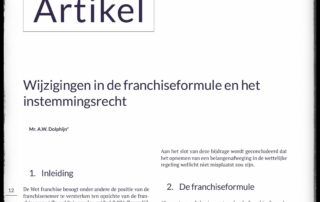The small print, obligatory for the franchisee?
In many franchise formulas, the franchisee is obliged to use the contacts put forward by the franchisor, such as a permanent supplier or permanent adviser. Because that regular supplier or consultant will often apply its own general terms and conditions, these terms and conditions are more or less imposed on the franchisee. This is not necessary.
They are often referred to as the ‘small print’: the general terms and conditions used by suppliers, banks, insurers, and so on. The conditions are often printed almost unreadably small on the back of a contract or quotation. And while everyone knows that the ‘small print’ is important, they are rarely read properly.
Nevertheless, it is very important to carefully read the general terms and conditions that the other party declares applicable when concluding a contract. Although the law offers some protection against unreasonably onerous provisions, that protection mainly applies to consumers and not to people acting in the course of a business.
The franchisee can always make agreements with any contracting party that deviate from one or more provisions of the general terms and conditions of this party. After all, freedom of contract also applies in this relationship. It is only a matter of reading the terms and conditions carefully. You can submit all provisions that you find and that you do not like to the contracting party. Ultimately, by negotiating this, you can arrive at a set of general terms and conditions that is acceptable to both parties.
An example to underline the importance of negotiation:
Suppose your supplier’s general terms and conditions state that a specified delivery date is never a deadline. In your industry, however, you regularly make agreements with your customers, which must be kept on time. If you are late, your customers will incur damage that they may be able to recover from you. It is then advisable to change the general terms and conditions with the supplier in such a way that the delivery date stated to the supplier is a strict deadline, unless it has been expressly stated that this is not the case.
Ludwig & Van Dam franchise attorneys, franchise legal advice

Other messages
Mitigation of fine due to ‘dominant position’ of franchisor
Mitigation of fine due to 'dominant position' of franchisor ...
It is a non-competition clause at the end of the lease
In the judgment of 26 March 2024, ECLI:NL:GHSHE:2024:1035, the Court ...
Looking ahead: Bottlenecks at the end of the franchise agreement
Of course, everyone starts a collaboration with good courage. But ...
Not just a successful appeal to incorrect forecasts
Not just a successful appeal to incorrect forecasts Introduction ...
Changes to the franchise formula and the right of consent
An article by Mr. was published in the leading legal ...
The National Franchise podcast
Guests on the National Franchise podcast are: Theodoor Ludwig ...







